Samsung Galaxy Nexus & Ice Cream Sandwich Review
by Brian Klug & Anand Lal Shimpi on January 18, 2012 1:34 PM ESTBattery life remains the other big axis on which smartphones are judged, and here we've turned to our regular 2011 suite of battery life tests to see how the Galaxy Nexus shakes out. Our battery life testing consists of a page loading suite which loads through a few dozen pages endlessly on both WiFi and cellular data until the phone dies, with the display set at 200 nits. For the cellular tests, we're always careful to test in cellular environments with decent signal (at least -75 dBm or higher) as well, since that's a factor. Next is a simple call test where we play music at both ends of a call until the device under test dies, and our final test is a WiFi hotspot workload which consists of four page loading tabs and a 128 kbps streaming MP3 station that runs until the phone dies.
First up are the web browsing tests over cellular 3G; this means EVDO Rev.A for the CDMA/LTE version, and WCDMA T-Mobile for the GSM/UMTS device.
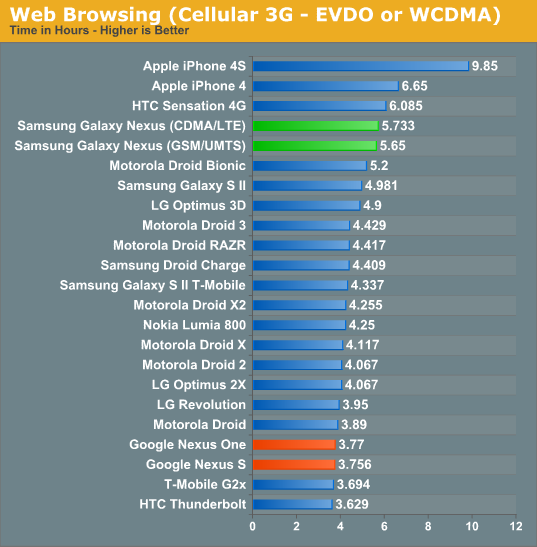
The Galaxy Nexii both do surprisingly well. I'm actually very impressed with how long the devices lasted subjectively on 3G and this definitely backs that up. Of course, both devices include beefy batteries, but Samsung has done a nice job thus far including big batteries without making devices bulky or heavy.
Next up is the same test, but on 4G LTE for the CDMA/LTE variant.
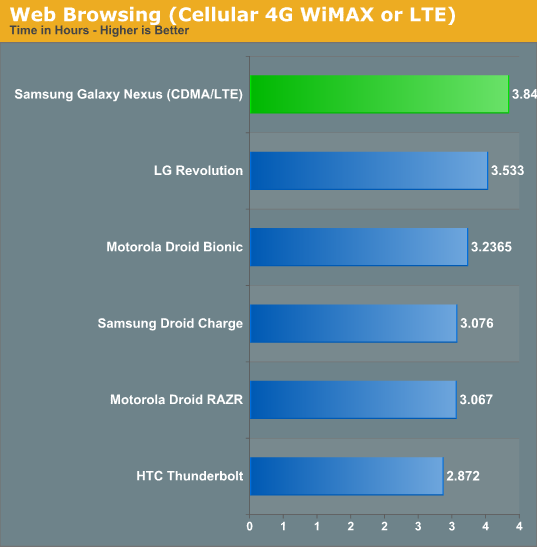
The Galaxy Nexus doesn't post numbers very far in front, but manages to come in the top of the pack on 4G LTE at just under 4 hours. This is a pretty impressive result, honestly, considering that CMC221 is likely made on the same 45nm manufacturing process as CMC220. Again, I'm impressed with the Galaxy Nexus' longevity even on 4G LTE.
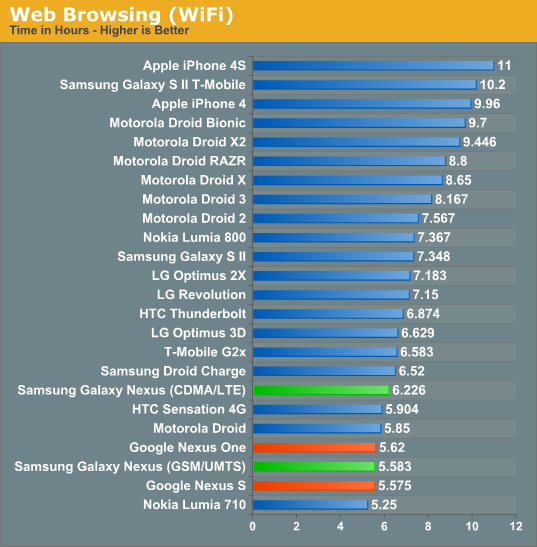
Surprisingly, the Galaxy Nexus can't break past that 6 hour mark even on WiFi, however, which does lead me to think we might be constrained by driving that display.
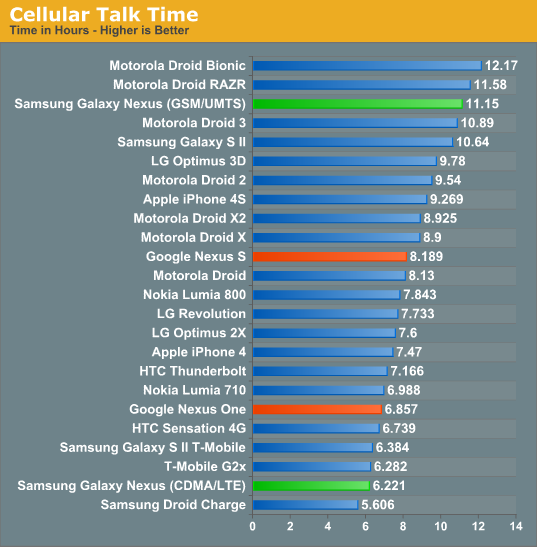
If you ever wanted to see how much difference having a different cellular architecture makes, see above. The GSM/UMTS Galaxy Nexus lasts impressively long on a voice call, at over 11 hours, yet its CDMA/LTE brother lasts just over half that.
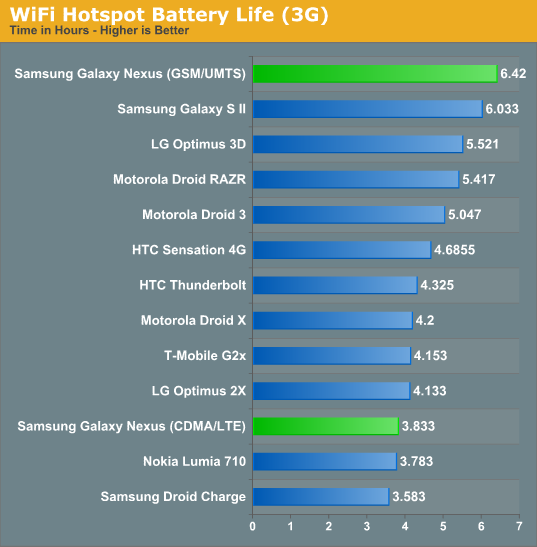
WiFi hotspot on 3G tells the same story - I'm not sure what Via Telecom's CBP7.1 draws in its active state for EVDO or 1x voice, but it seems to eat up more power than the XMM 6260 (X-Gold 626) in the GSM/UMTS Galaxy Nexus.
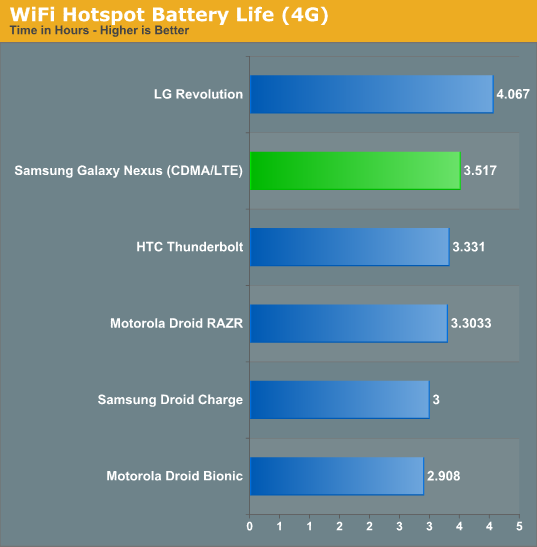
As a 4G LTE WiFi hotspot, the Galaxy Nexus loses its edge over the Revolution, but does come in just ahead of the rest of the 4G LTE herd.
The story of battery life on the Galaxy Nexus unsurprisingly depends on which variant you're talking about. For a phone with a 4.65" display, I'd say I'm impressed with the battery life on both devices - remember that the area that needs to get lit up goes as r^2 - increasing that and not killing the battery is a big feat. In addition, I'd wager that using the OpenGL ES renderpath (and accelerated browser in 4.0) definitely helped both Galaxy Nexus devices post impressive scores. As for the two variants, the GSM/UMTS device has impressively long battery life pretty much across the board. Playing with that phone, I was rarely wanting for more on my regular use schedule (I charge at night on my nightstand). We've seen XMM6260 before in numerous devices where it seems to be a pretty good citizen.
The CDMA/LTE variant, on the other hand, depends strongly on what air interface you end up using most - on 4G LTE the device comes in at the front of the pack usually, and its 3G web browsing test is above average. However, if you make a lot of voice calls, the phone might not cut it. Unsurprisingly the CDMA/LTE Galaxy Nexus does nothing to dramatically change 4G LTE battery life - for that we're still waiting for upcoming 28nm LTE basebands.










185 Comments
View All Comments
Tujan - Wednesday, January 18, 2012 - link
Concerning the youtube video shown about the android smartphone. No misconception here,but is it the intention of the video to put your thumb so much at the forefront of the small phone,somehow toggling between 'both eyes' of the viewer. ? Is that the intention of the video ?Pure punn intended that is an awesome big speaker you are speaking to. And true even though the video was most likely rendered in 'full part',with both video and audio attached,I cannot help the feeling that there IS SOME LATENCY between my chinese made glasses and the finish of my lcd.
The fact that you are discussing a radio device,and I am utilizing a later viewing of it over a wired internet connection. Does not diminish the fact that your radio devices capability of facial recognition,and my lcds display of it is no substitute for taking x-rays if you actually need to.
I see that you are descript in functioning your arms across the whole of the screen at the making of your video. And there is that very large meter between the preposition of the distance of the audio device,and the radio device that is to conclude that preposition.
Punn accepted there is certainly some latency there that is perfectly conceptual. Between the foreground,and the background. And the autonomic acceptance of my viewing it.
You notice that at times as a forefront,you have a wide screen rendering. Then at other times there is the focus 'in'. The difference in doing so is the focal point of my comment in that subject of its latency.
And that truly the speaking IS a separate distinction of a Microphone. Than that of a speaker,and the screen displayed. Your being behind it shouldn't be misconstrued of what my comment is coordinating to account to. Since obviously the latency between my glasses and what I see on the screen at my viewing of it is of no consequence to your creation of it.
Mentioning that relationally you cannot change the environment around you no more than I can make your video for you. Perhaps someone will recognize this.
And thanks.
nsnsmj - Wednesday, January 18, 2012 - link
I always enjoy how detailed the reviews are.BitGambit - Wednesday, January 18, 2012 - link
I love this phone, but I have owned 2 different Nexii with the "Mura" screen issue. The first one I owned was glaringly obvious, but the second one less so, but it's still there. I was not able to exchange it for the second time, because the defect wasn't apparent enough to warrant an exchange, explains the Verizon employee. It pains me because having a good screen is important to me and I was looking forward to release of the Galaxy Nexus. I'm absolutely jealous of those who have a Galaxy Nexus with immaculate AMOLED screens.crankerchick - Wednesday, January 18, 2012 - link
I haven't had a chance to read the whole review, but I'm happy to see it. I've been checking everyday thinking I must have missed the review. It's great to see time and care being put into the review, as always. The video at the bottom was also very insightful and hits right in the points if why I prefer Android and the evolution it has seen, over iOS when it comes to my mobile devices. ICS flies in my Galaxy Nexus and my XOOM! I don't ever see 25 Mbps on my Nexus though, or all the bars for that matter. Maybe I have a signal issue? :-pflomt - Thursday, January 19, 2012 - link
I see you have the iphone 4s getting 9.85 hours of web browsing. Do you receive a phone from Apple to test, or do you go to the store and buy one?The reason I am asking is I have a 4s and I can tell you mine, and the people I know that have one are lucky to get 9.85 hours of battery life with the phone sitting on the nigh stand.
Thanks for the great reviews.
doobydoo - Thursday, January 19, 2012 - link
I think all the figures Anandtech post are their own measured statistics.I have a 4s and I, and the people I know that have one, are amazed by how long the battery life lasts, both in general and when web browsing.
When sitting on the night stand for 9.85 hours a very small percentage of battery life is depleted.
flomt - Thursday, January 19, 2012 - link
I know 4 other people with a 4s, none of them can last 24 hours with very light usage. 9 hours of web browsing is not even kinda of possible. All are on the most current release 5.0.1Reading the Apple forums, I am not the only one. Do the phones with poor battery life all originate in a different factory than the ones that last a long time? have a different version of the radio?
Apple is just denying that they have a problem now and I can tell you that they really do have a serious problem with some phones.
tipoo - Thursday, January 19, 2012 - link
Are you running push e-mail by any chance? That kills idle battery life.flomt - Thursday, January 19, 2012 - link
Nope, manual sync only.tom5 - Thursday, January 19, 2012 - link
You state in the article here that the camera sensor is a NOT-back-illuminated S5K4E1G sensor and Chipworks in the teardown article states that Galaxy Nexus is using "S5K4E5YA 5 Mp, 1.4 µm pixel pitch back illuminated CMOS image sensor":http://goo.gl/gvIWV
Who is right?